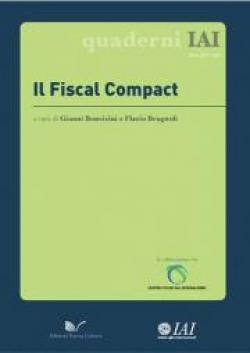Il Fiscal Compact
Composed of only 16 articles, the so-called Fiscal Compact (Treaty on Stability, Coordination and Governance in the Economic and Monetary Union, TSCG) is an extremely complex treaty. Not only is it an intergovernmental rather than "community" agreement, but it makes heavy demands relating to fiscal discipline on the states adopting it, above all the heavily indebted ones, like Italy. Two think tanks traditionally focused on European integration, the IAI in Rome and the CSF in Turin, therefore decided to analyze the consequences that the Fiscal Compact will have on the Treaty of Lisbon, as well as on the EU economy and, especially, that of the Eurozone. Experts from various fields were called upon to study certain aspects and possible consequences of the new treaty. In particular, the Fiscal Compact's impact on the Union's institutions and procedures; the possibility that the treaty will lead to differentiated integration in the EU ; the problem of legitimizing the decisions taken pursuant to the new treaty; the steps towards a Fiscal Union; and, finally, Italy's contribution to the Fiscal Compact and the possible convergence of its position with that of other EU countries. The volume includes the text of the Fiscal Compact, so that readers can link the references in the various chapters to the new Treaty, as well as a data card listing all the measures adopted by the European Council during the crisis.
A IAI-Centro studi sul federalismo publication. The volume has been presented in Rome on 18 December 2012.
-
Details
Roma, Nuova Cultura, 2012, 84 p. -
In:
-
Issue
5 -
ISBN/ISSN/DOI:
978-88-6134-859-2
Introduzione, di Gianni Bonvicini e Flavio Brugnoli
Lista delle abbreviazioni
1. L'impatto della crisi sulle istituzioni dell'Unione, di Gian Luigi Tosato
2. Fiscal Compact e conseguenze dell'integrazione differenziata nell'Ue, di Lucia Serena Rossi
3. L'art. 13 del Fiscal Compact e il ruolo dei Parlamenti nel sistema multilivello, di Giuseppe Martinico
4. Dal Fiscal Compact all'Unione fiscale, di Alberto Majocchi
5. Il contributo italiano al Fiscal Compact e le possibili convergenze con le posizioni degli altri paesi Ue, di Michele Comelli
Allegati
1. Trattato sulla stabilità, il coordinamento e la governance nell'unione economica e monetaria
2. Scheda relativa alle principali disposizioni e strumenti adottati dall'Unione europea in risposta alla crisi dei debiti sovrani dei paesi dell'area euro, a cura di Michele Comelli
Topic
Tag
Related content
-
Event14/02/2014
Il Fiscal Compact
leggi tutto



